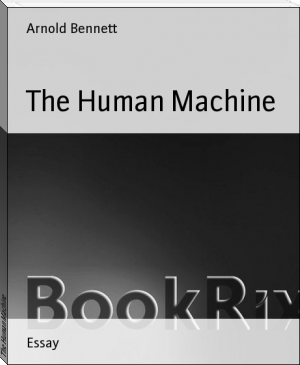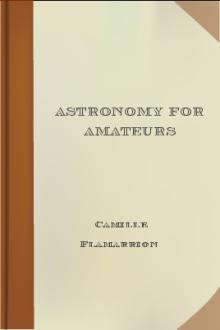The Human Machine - Arnold Bennett (sight word readers .TXT) 📗

- Author: Arnold Bennett
Book online «The Human Machine - Arnold Bennett (sight word readers .TXT) 📗». Author Arnold Bennett
In the matter of concentration, I hesitate to recommend Mrs. Annie Besant's _Thought Power_, and yet I should be possibly unjust if I did not recommend it, having regard to its immense influence on myself. It is not one of the best books of this astounding woman. It is addressed to theosophists, and can only be completely understood in the light of theosophistic doctrines. (To grasp it all I found myself obliged to study a much larger work dealing with theosophy as a whole.) It contains an appreciable quantity of what strikes me as feeble sentimentalism, and also a lot of sheer dogma. But it is the least unsatisfactory manual of the brain that I have met with. And if the profane reader ignores all that is either Greek or twaddle to him, there will yet remain for his advantage a vast amount of very sound information and advice. All these three books are cheap.
XIV
A MAN AND HIS ENVIRONMENT
I now come to an entirely different aspect of the whole subject. Hitherto I have dealt with the human machine as a contrivance for adapting the man to his environment. My aim has been to show how much depends on the machine and how little depends on the environment, and that the essential business of the machine is to utilise, for making the stuff of life, the particular environment in which it happens to find itself--and no other! All this, however, does not imply that one must accept, fatalistically and permanently and passively, any preposterous environment into which destiny has chanced to throw us. If we carry far enough the discipline of our brains, we can, no doubt, arrive at surprisingly good results in no matter what environment. But it would not be 'right reason' to expend an excessive amount of will-power on brain-discipline when a slighter effort in a different direction would produce consequences more felicitous. A man whom fate had pitched into a canal might accomplish miracles in the way of rendering himself amphibian; he might stagger the world by the spectacle of his philosophy under amazing difficulties; people might pay sixpence a head to come and see him; but he would be less of a nincompoop if he climbed out and arranged to live definitely on the bank.
The advantage of an adequate study of the control of the machine, such as I have outlined, is that it enables the student to judge, with some certainty, whether the unsatisfactoriness of his life is caused by a disordered machine or by an environment for which the machine is, in its fundamental construction, unsuitable. It does help him to decide justly whether, in the case of a grave difference between them, he, or the rest of the universe, is in the wrong. And also, if he decides that he is not in the wrong, it helps him to choose a new environment, or to modify the old, upon some scientific principle. The vast majority of people never know, with any precision, why they are dissatisfied with their sojourn on this planet. They make long and fatiguing excursions in search of precious materials which all the while are concealed in their own breasts. They don't know what they want; they only know that they want something. Or, if they contrive to settle in their own minds what they do want, a hundred to one the obtaining of it will leave them just as far off contentment as they were at the beginning! This is a matter of daily observation: that people are frantically engaged in attempting to get hold of things which, by universal experience, are hideously disappointing to those who have obtained possession of them. And still the struggle goes on, and probably will go on. All because brains are lying idle! 'It is no trifle that is at stake,' said Epictetus as to the question of control of instinct by reason. '_It means, Are you in your senses or are you not_?' In this significance, indubitably the vast majority of people are not in their senses; otherwise they would not behave as they do, so vaguely, so happy-go-luckily, so blindly. But the man whose brain is in working order emphatically _is_ in his senses.
And when a man, by means of the efficiency of his brain, has put his reason in definite command over his instincts, he at once sees things in a truer perspective than was before possible, and therefore he is able to set a just value upon the various parts which go to make up his environment. If, for instance, he lives in London, and is aware of constant friction, he will be led to examine the claims of London as a Mecca for intelligent persons. He may say to himself: 'There is something wrong, and the seat of trouble is not in the machine. London compels me to tolerate dirt, darkness, ugliness, strain, tedious daily journeyings, and general expensiveness. What does London give me in exchange?' And he may decide that, as London offers him nothing special in exchange except the glamour of London and an occasional seat at a good concert or a bad play, he may get a better return for his expenditure of brains, nerves, and money in the provinces. He may perceive, with a certain French novelist, that 'most people of truly distinguished mind prefer the provinces.' And he may then actually, in obedience to reason, quit the deceptions of London with a tranquil heart, sure of his diagnosis. Whereas a man who had not devoted much time to the care of his mental machinery could not screw himself up to the step, partly from lack of resolution, and partly because he had never examined the sources of his unhappiness. A man who, not having full control of his machine, is consistently dissatisfied with his existence, is like a man who is being secretly poisoned and cannot decide with what or by whom. And so he has no middle course between absolute starvation and a continuance of poisoning.
As with the environment of place, so with the environment of individuals. Most friction between individuals is avoidable friction; sometimes, however, friction springs from such deep causes that no skill in the machine can do away with it. But how is the man whose brain is not in command of his existence to judge whether the unpleasantness can be cured or not, whether it arises in himself or in the other? He simply cannot judge. Whereas a man who keeps his brain for use and not for idle amusement will, when he sees that friction persists in spite of his brain, be so clearly impressed by the advisability of separation as the sole cure that he will steel himself to the effort necessary for a separation. One of the chief advantages of an efficient brain is that an efficient brain is capable of acting with firmness and resolution, partly, of course, because it has been toned up, but more because its operations are not confused by the interference of mere instincts.
Thirdly, there is the environment of one's general purpose in life, which is, I feel convinced, far more often hopelessly wrong and futile than either the environment of situation or the environment of individuals. I will be bold enough to say that quite seventy per cent. of ambition is never realised at all, and that ninety-nine per cent. of all realised ambition is fruitless. In other words, that a gigantic sacrifice of the present to the future is always going on. And here again the utility of brain-discipline is most strikingly shown. A man whose first business it is every day to concentrate his mind on the proper performance of that particular day, must necessarily conserve his interest in the present. It is impossible that his perspective should become so warped that he will devote, say, fifty-five years of his career to problematical preparations for his comfort and his glory during the final ten years. A man whose brain is his servant, and not his lady-help or his pet dog, will be in receipt of such daily content and satisfaction that he will early ask himself the question: 'As for this ambition that is eating away my hours, what will it give me that I have not already got?' Further, the steady development of interest in the hobby (call it!) of common-sense daily living will act as an automatic test of any ambition. If an ambition survives and flourishes on the top of that daily cultivation of the machine, then the owner of the ambition may be sure that it is a genuine and an invincible ambition, and he may pursue it in full faith; his developed care for the present will prevent him from making his ambition an altar on which the whole of the present is to be offered up.
I shall be told that I want to do away with ambition, and that ambition is the great motive-power of existence, and that therefore I am an enemy of society and the truth is not in me. But I do not want to do away with ambition. What I say is that current ambitions usually result in disappointment, that they usually mean the complete distortion of a life. This is an incontestable fact, and the reason of it is that ambitions are chosen either without knowledge of their real value or without knowledge of what they will cost. A disciplined brain will at once show the unnecessariness of most ambitions, and will ensure that the remainder shall be conducted with reason. It will also convince its possessor that the ambition to live strictly according to the highest common sense during the next twenty-four hours is an ambition that needs a lot of beating.
XV
L.S.D.
Anybody who really wishes to talk simple truth about money at the present time is confronted by a very serious practical difficulty. He must put himself in opposition to the overwhelming body of public opinion, and resign himself to being regarded either as a _poseur_, a crank, or a fool. The public is in search of happiness now, as it was a million years ago. Money is not the principal factor in happiness. It may be argued whether, as a factor in happiness, money is of twentieth-rate importance or fiftieth-rate importance. But it cannot be argued whether money, in point of fact, does or does not of itself bring happiness. There can be no doubt whatever that money does not bring happiness. Yet, in face of this incontrovertible and universal truth, the whole public behaves exactly as if money were the sole or the principal preliminary to happiness. The public does not reason, and it will not listen to reason; its blood is up in the money-hunt, and the philosopher might as well expostulate with an earthquake as try to take that public by the button-hole and explain. If a man sacrifices his interest under the will of some dead social tyrant in order to marry whom he wishes, if an English minister of religion declines twenty-five thousand dollars





Comments (0)